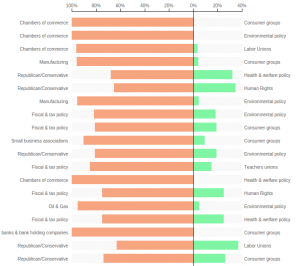As promised, not a deeply technical (legal) analysis of District of Columbia vs. Heller but summary of the major themes in Scalia’s opinion for the majority.
District of Columbia v. Heller, 554 U.S. 570, 128 S. Ct. 2783, 171 L. Ed. 2d 637 (2008) [2008 BL 136680] has the following pagination markers:
* U.S. (official)
** S. Ct. (West Publishing)
*** L. Ed. 2d (Lawyers Editon 2nd)
**** BL (Bloomberg Law)
In the text you will see: [*577] for example which is the start of page 577 in the official version of the opinion. I use the official pagination herein.
Facts: Heller, a police officer applied for a handgun permit, which was denied. Without a permit, possession of a handgun was banned in the District of Columbia. Even if a permit were obtained, the handgun had to be disabled and unloaded. Heller sued the district saying that the Second Amendment protects an individual’s right to possess firearms and that the city’s ban on handguns and the non-functioning requirement, should the handgun be required for self-defense, infringed on that right.
[Observation: When challenging a law on constitutional grounds, get an appropriate plaintiff to bring the suit. I haven’t done the factual background but I rather doubt that Heller was just an ordinary police officer who decided on his own to sue the District of Columbia. Taking a case to the Supreme Court is an expensive proposition. In challenging laws that infringe on hackers, use security researchers, universities, people with clean reputations. Not saying you can’t win with others but on policy debates its better to wear your best clothes.]
Law: Second Amendment: “A well regulated Militia, being necessary to the security of a free State, the right of the people to keep and bear Arms, shall not be infringed.”
Scalia begins by observing:
“[t]he Constitution was written to be understood by the voters; its words and phrases were used in their normal and ordinary as distinguished from [****4] technical meaning.” United States v. Sprague, 282 U. S. 716, 731 (1931); see also Gibbons v. Ogden, 9 Wheat. 1, 188 (1824). [*576]
The crux of Scalia’s argument comes early and is stated quite simply:
The Second Amendment is naturally divided into two parts: its prefatory clause and its operative clause. The former does not limit the latter grammatically, but rather announces a purpose. The Amendment could be rephrased, “Because a well regulated Militia is necessary to the security of a free State, the right of the people to keep and bear Arms shall not be infringed.” [*577]
With that “obvious” construction, Scalia sweeps to one side all arguments that attempt to limit the right to bear arms to a militia context. Its just an observation, not binding in any way on the operative clause. He does retain it for later use to argue the interpretation of the operative clause is consistent with that purpose.
Scalia breaks his analysis of the operative clause into the following pieces:
a. “Right of the People.”
b. “Keep and Bear Arms”
c. Meaning of the Operative Clause.
“Right of the People.” In perhaps the strongest part of the opinion, Scalia observes that “right of the people” occurs in the unamended Constitution and Bill of Rights only two other times, First Amendment (assemby-and-petition clause) and Fourth Amendment (search-and-seizure) clause. The Fourth Amendment has fallen on hard times of late but the First Amendment is still attractive to many. He leaves little doubt that the right to “keep and bear arms” (the next question), is undoubtedly meant to be an individual right. [*579]
“Keep and Bear Arms” Before turning to “keep” and “bear,” Scalia makes two important points with regard to “arms:”
Before addressing the verbs “keep” and “bear,” we interpret their object: “Arms.” The 18th-century meaning is no different from the meaning today. The 1773 edition of Samuel Johnson’s dictionary defined “arms” as “[w]eapons of offence, or armour of defence.” 1 Dictionary of the English Language 106 (4th ed.) (reprinted 1978) (hereinafter Johnson). Timothy Cunningham'[****6] s important 1771 legal dictionary defined “arms” as “any thing that a man wears for his defence, or takes into his hands, or useth in wrath to cast at or strike another.” 1 A New and Complete Law Dictionary; see also N. Webster, American Dictionary of the English Language (1828) (reprinted 1989) (hereinafter Webster) (similar).
The term was applied, then as now, to weapons that were not specifically designed for military use and were not employed in a military capacity. For instance, Cunningham’s legal dictionary gave as an example of usage: “Servants and labourers shall use bows and arrows on Sundays, & c. and not bear other arms.” See also, e.g., An Act for the trial of Negroes, 1797 Del. Laws ch. XLIII, § 6, in 1 First Laws of the State of Delaware 102, 104 (J. Cushing ed. 1981 (pt. 1)); see generally State v. Duke, 42 Tex. 455, 458 (1874) (citing decisions of state courts construing “arms”). Although one founding-era thesaurus limited “arms” (as opposed to “weapons”) to “instruments of offence generally made use of in war,” even that source stated that all firearms constituted “arms.” 1 J. Trusler, The Distinction Between Words Esteemed [*582] Synonymous in the English Language 37 (3d ed. 1794) (emphasis added).
Some have made the argument, bordering on the frivolous, that only those arms in existence in the 18th century are protected by the Second Amendment. We do not interpret constitutional rights that way. Just as the First Amendment protects modern forms of communications, e. g., Reno v. American Civil Liberties Union, 521 U. S. 844, 849 (1997), and the Fourth Amendment applies to modern forms of search, e.g., Kyllo v. United States, 533 U. S. 27, 35-36 (2001), the Second Amendment extends, [**2792] prima facie, to all instruments that constitute bearable arms, even those that were not in existence at the time of the founding. [*581-*582]
Although he says “The 18th-century meaning is no different from the meaning today.” at the outset, the sources cited make it clear that it is the character of an item as a means of offense or defense, generally used in war, that makes it fall into the category “arms.” Which extends to bows and arrows as well as 18th century firearms as well as modern firearms.
“Arms” not limited to 18th Century “Arms”
The second point, particularly relevant to hackers, is that arms are not limited to those existing in the 18th century. Scalia specifically calls out both First and Fourth Amendment cases where rights have evolved along with modern technology. The adaptation to modern technology under those amendments is particularly relevant to making a hackers argument under the Second Amendment.
Posession/Bearing Arms
The meaning of “keep arms” requires only a paragraph or two:
Thus, the most natural reading of “keep Arms” in the Second Amendment is to “have weapons.” [*582]
Which settles the possession of arms question, but what about the right to carry such arms?
The notion of “bear arms” devolves into a lively contest of snipes between Scalia and Stevens. You can read both the majority opinion and the dissent if you are interested but the crucial text reads:
We think that JUSTICE GINSBURG accurately captured the natural meaning of “bear arms.” Although the phrase implies that the carrying of the weapon is for the purpose of “offensive or defensive action,” it in no way connotes participation in a structured military organization.
From our review of founding-era sources, we conclude that this natural meaning was also the meaning that “bear arms” had in the 18th century. In numerous instances, “bear arms” was unambiguously used to refer to the carrying of weapons outside of an organized militia. [*584]
I mention that point just in case some wag argues that cyber weapons should be limited to your local militia or that you don’t have the right to carry such weapons on your laptop, cellphone, USB drive, etc.
Meaning of the Operative Clause
c. Meaning of the Operative Clause. [4] Putting all of these textual elements together, we find that they guarantee the individual right to possess and carry weapons in case of confrontation. This meaning is strongly confirmed by the historical background of the Second Amendment. [5] We look to this because it has always been widely understood that the Second Amendment, like the First and Fourth Amendments, codified a pre-existing right. The very text of the Second Amendment implicitly recognizes the pre-existence of the right and declares only that it “shall not be infringed.” As we said in United [****11] States v. Cruikshank, 92 U. S. 542, 553 (1876), “[t]his is not a right granted by the Constitution. Neither is it in any manner dependent upon that instrument for its existence. The [**2798] second amendment declares [***658] that it shall not be infringed. . . .”[fn16] [*592]
You can’t get much better than a pre-existing right, at least not with the current Supreme Court composition. Certainly sounds like it would extent to defending your computer systems, which the government seems loathe to undertake.
Motivation for the Second Amendment
Skipping over the literalist interpretation of the prefactory clause, Scalia returns to the relationship between the prefatory and operative clause. The opinion goes on for twenty-one (21) pages at this point but an early paragraph captures the gist of the argument if not all of its details:
The debate with respect to the right to keep and bear arms, as with other guarantees in the Bill of Rights, was not over whether it was desirable (all agreed that it was) but over whether it needed to be codified in the Constitution. During the 1788 ratification debates, the fear that the Federal Government would disarm the people in order to impose rule through a standing army or select militia was pervasive in Anti-federalist rhetoric. See, e. g., Letters from The Federal Farmer III (Oct. 10, 1787), in 2 The Complete Anti-Federalist 234, 242 (H. Storing ed. 1981). John Smilie, for example, worried not only that Congress’s “command of the militia” could be used to create a “select militia,” or to have “no militia at all,” but also, as a separate concern, that “[w]hen a select militia is formed; the people in general may be disarmed.” 2 Documentary History of the Ratification of the Constitution 508-509 (M. Jensen ed. 1976) (hereinafter [*599] Documentary Hist.). Federalists responded that because Congress was given no power to abridge the ancient right of individuals to keep and bear arms, such a force could never oppress the people. See, e.g., A Pennsylvanian III (Feb. 20, 1788), in The Origin of the Second Amendment 275, [****15] 276 (D. Young ed., 2d ed. 2001) (hereinafter Young); White, To the Citizens of Virginia (Feb. 22, 1788), in id., at 280, 281; A Citizen of America (Oct. 10, 1787), in id., at 38, 40; Foreign Spectator, Remarks on the Amendments to the Federal Constitution, Nov. 7, 1788, in id., at 556. It was understood across the political spectrum that the right helped to secure the ideal of a citizen militia, which might be necessary to oppose an oppressive military force if the constitutional order broke down.[*598-*599]
Whether you choose to emphasize the disarming of the people by regulation of cyberweapons or the overreaching of the Federal government, the language here is clearly of interest in arguing for cyberweapons under the Second Amendment. The majority opinion on this point is found at pages [*598-*619].
Limitations on “Arms”
The right to possess arms, including cyberweapons, isn’t a slam dunk. The Federal and State governments can place some regulations on the possession of arms. One example that Scalia discusses is United States v. Miller, 307 U. S. 174, 179 (1939). Reading Miller:
…to say only that the Second Amendment [**2816] does not protect those weapons not typically possessed by law-abiding citizens for lawful purposes, such as short-barreled shotguns. That accords with the historical understanding of the scope of the right, see Part III, infra.[fn25] [*625]
So hackers will lose on blue boxes, if you know the reference but quite possibly win on software, code, etc. So far as I know, no one has challeged the right of computer users to protect themselves.
Is there a balancing test for cyber weapons?
The balance of the opinion is concerned with the case at hand and sparring with Justice Breyer but it does have this jewel when it is suggested that the Second Amendment should be subject to a balancing test (a likely argument about cyber weapons):
We know of no other enumerated constitutional right whose core protection has been subjected to a freestanding “interest-balancing” approach. The very enumeration of the right takes out of the hands of government — even the Third Branch of Government — the power to decide on a case-by-case basis whether the right is really worth insisting upon. A constitutional guarantee subject to future judges’ assessments of its usefulness is no constitutional guarantee at all. [15] Constitutional rights are enshrined with the scope they were understood to have when the people adopted [*635] them, whether or not future legislatures or (yes) even future judges think that scope too broad. We would not apply an “interest-balancing” approach to the prohibition of a peaceful neo-Nazi march through Skokie. See National Socialist Party of America v. Skokie, 432 U. S. 43 (1977) (per curiam). The First Amendment contains the freedom-of-speech guarantee that the people ratified, which included exceptions for obscenity, libel, and disclosure of state secrets, but not for the expression of extremely unpopular and wrongheaded views. The Second Amendment is no different. Like the First, it is the very product of an interest balancing by the people — which JUSTICE BREYER would now conduct for them anew. And whatever else it leaves to future evaluation, it surely elevates above all other interests the right of law-abiding, responsible citizens to use arms in defense of hearth and home. [*634-*635]
I rather like the lines:
The very enumeration of the right takes out of the hands of government — even the Third Branch of Government — the power to decide on a case-by-case basis whether the right is really worth insisting upon. A constitutional guarantee subject to future judges’ assessments of its usefulness is no constitutional guarantee at all.
Is the right to privacy no right at all because the intelligence community lapdog FISA court decides in secret when our right to privacy is unnecessary?
Open Issues
Forests have been depopulated to produce the paper required for all the commentaries on District of Columbia v. Heller. What I have penned above is a highly selective summary in hopes of creating interest in a Second Amendment argument for the possession and discussion of cyber weapons.
Open issues include:
- Evolution of the notion of “arms” for the Second Amendment.
- What does it mean to posses a cyber weapon? Is code required? Binary?
- Defensive purposes of knowledge or cyber weapons.
- Analogies to disarming the public.
- Others?
As I suggested in A Well Regulated Militia, a Second Amendment argument to protect our rights to cyber weapons could prove to be more successful than other efforts to date.
Unless you like being disarmed while government funded hackers invade your privacy of course.
Let me know if you are interested in sponsoring research on Second Amendment protection for cyber weapons.
PS: Just so you know, I took my own advice and joined the NRA earlier this week. Fights like this can only be won with allies, strong allies.




